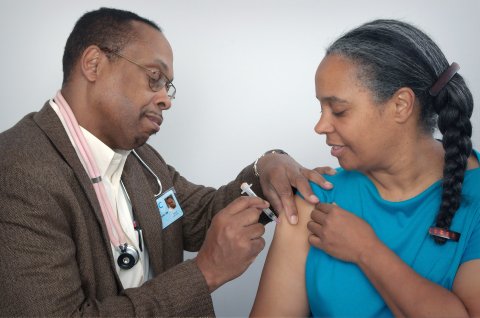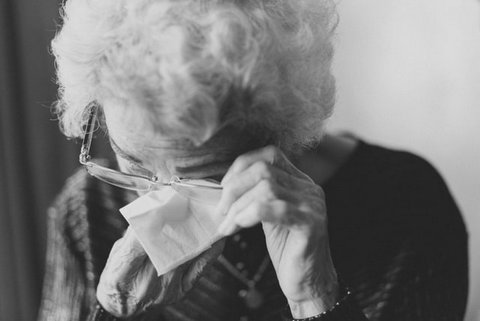
16 Mar Black Californians Urged to ‘Trust Science,’ Get Vaccinated

A health practitioner administers a vaccine in 2006. (CDC on Unsplash)
The CC Pulse Editors
Deena Mangrum of Los Angeles was apprehensive about getting the COVID-19 vaccine. In her mind — like many other African Americans — the vaccines were so new that she wanted to take a wait-and-see approach.
But a friend who works for Kaiser Permanente assured her the vaccine was safe and effective.
“She said I was making a choice. ‘Either you’re gonna get COVID, or your gonna get the vaccine. There’s not a lot of other choices to be made, unless you continue to isolate,’ ” Mangrum said.
The conversation led Mangrum to research the vaccines, finally deciding to “trust science.” She got the vaccine two weeks ago.
“I heard that very few Black people were getting the vaccine here in California. So that just said to me, ‘Let me just make a decision that’s best for me and my family,’ ” she said.
>>>Read: ‘The Vaccine Is Not the Best Option, but It Is the Only Option’
Mangrum shared her experiences during a recent panel discussion hosted by California Black Media. The online briefing also brought together state officials, medical professionals and community members.
Now that she’s been vaccinated, Mangrum says she has been trying to get as many people as she can to get the vaccine.
“My mom is 93. She didn’t really want to get it, even as I was trying to convince her,” Mangrum said. “Kaiser called her, got her in, and she just got her second shot last week. She is feeling great.”
As distribution of the COVID-19 vaccines ramps up across the state, medical experts are encouraged by stories like Mangrum’s, continuing to stress that getting vaccinated is the best way to get through the pandemic.
“That is the only way we will reach herd immunity,” Dr. Oliver T. Brooks, with the Watts HealthCare Corporation, said during the teleconference.
>>>Read: ‘Time Will Always Tell’: Doctor Addresses Coronavirus Vaccine Concerns
According to new data from the Pew Research Center, 78% of Black adults personally know someone who has been hospitalized or died from complications of COVID-19.
CDC data shows that life expectancy for African Americans has fallen 2.7 years from pre-pandemic levels, compared with one year for the overall population.
Earlier this month, California officials tapped Blue Shield of California to manage the state’s COVID-19 vaccine distribution network, placing a priority on disproportionately impacted communities.
Kimberly Goode, Blue Shield’s senior vice president of external affairs, said the goal is to reach every Californian, particularly those most hurt by the pandemic.
“Our goal is to save more lives and make sure the hardest hit communities are reached as quickly as we possibly can,” Goode said.
Blue Shield will work with local health departments to support the state’s five-point equity plan and use data to make recommendations to help with equitable distribution of the vaccine.
Last week, the U.S. Centers for Disease Control and Prevention said fully vaccinated people could be with other fully vaccinated people indoors without wearing masks or practicing social distancing.
Despite the new guidelines, Brooks recommends a more conservative approach, in light of how the African American community has been ravaged by COVID-19.
>>>Read: “No Going Back”: Scholars Say Lives of Black Californians Must Improve After COVID
“I hear [the CDC recommendations], and I understand. I may not do that just yet, because I am so intense about not giving it to someone,” he said. “I feel comfortable not getting it. My vaccine will protect me. But there’s a 5% chance that I’m wrong, and that’s important.”
For those who chose to be around others without wearing masks, Brooks recommends continuing to keep six feet distance and trying to meet outdoors.
While experts consider the vaccine safe, it does have possible side effects. Among them, according to the CDC, are pain, redness and swelling in the arm people get their shots in, which is why experts recommend getting the shot in your non-dominant arm.
Since the vaccine is teaching your immune system how to combat a potentially lethal pathogen, some people have reported mild to moderate short-term cold-like symptoms that can come with most vaccines: tiredness, headache, muscle pain, chills, fever and nausea. For that, the suggested treatment is over-the-counter pain relievers, fluids and rest.
Fear of potentially worse side effects and other concerns have some people distrustful of the COVID-19 vaccine.
Pew Research found that of the 37% of African Americans who say they will not get the vaccine, 84% cite concerns about side effects while 74% say the vaccines were developed and tested too quickly. Of the Black Americans who do not intend to get a vaccine, half attribute their decision to the medical care system’s past mistakes.
Nonetheless, Dr. Jerry P. Abraham, director of vaccine programs at Kedren Community Health Center in South Los Angeles, encouraged African Americans in California to get vaccinated as soon as they are eligible.
“Take 10 people with you when you’re eligible. Get your shot,” he said. “This is not Tuskegee; this is not the Henrietta Lacks situation. This is an FDA-approved emergency-use vaccine. This is your vaccine, your hard-earned taxpayer funded vaccine. Your historically Black medical society was watching and at the table. Do not be afraid.”





No Comments